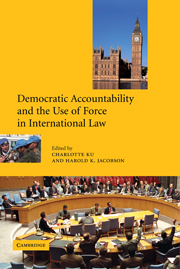Book contents
- Frontmatter
- Contents
- List of figures
- List of tables
- Notes on contributors
- Preface
- List of abbreviations
- I Introduction
- II The domestic and international context
- III Traditional contributors to international military operations
- IV Newcomers to international military operations
- 9 Japan: moderate commitment within legal strictures
- 10 Germany: ensuring political legitimacy for the use of military forces by requiring constitutional accountability
- V Permanent members of the UN Security Council
- VI Conclusion
- Appendix A. Uses of military forces under the auspices of the UN and NATO
- Appendix B. Country participation in international operations, 1945–2000
- References
- Index
9 - Japan: moderate commitment within legal strictures
Published online by Cambridge University Press: 30 July 2009
- Frontmatter
- Contents
- List of figures
- List of tables
- Notes on contributors
- Preface
- List of abbreviations
- I Introduction
- II The domestic and international context
- III Traditional contributors to international military operations
- IV Newcomers to international military operations
- 9 Japan: moderate commitment within legal strictures
- 10 Germany: ensuring political legitimacy for the use of military forces by requiring constitutional accountability
- V Permanent members of the UN Security Council
- VI Conclusion
- Appendix A. Uses of military forces under the auspices of the UN and NATO
- Appendix B. Country participation in international operations, 1945–2000
- References
- Index
Summary
Introduction
Japan's participation in United Nations peace operations has long suffered from an underlying tension between the country's general support for the United Nations and its deep-rooted reluctance to use military force.
The devastation of the Second World War had created an abiding suspicion among the Japanese toward military organizations and military solutions. This suspicion was manifest in the strong support for article 9 of the Showa Constitution of 1946, which renounced war and the means to prosecute war. At the same time, Japan has consistently been one of the strongest proponents of the United Nations. Since the time Japan was admitted to membership in the UN in 1956, the Ministry of Foreign Affairs (MOFA) has made every effort to play an active role in all aspects of the organization, except those involving the military. The Japanese public generally approved these efforts. However, as the UN's primary role of maintaining peace and security revives with the demise of the Cold War and its peace operations expand and diversify, Japan has come under growing pressure to commit more substantially to peace operations under UN auspices, including direct participation in UN military activities.
In the 1990s, the tension came to the fore in a dramatic fashion, as the government and people of Japan were compelled to reconsider the policy defining the scope of Japanese contributions to UN peace operations. The Peacekeeping Law adopted on June 19, 1992 is the main building block of that policy.
- Type
- Chapter
- Information
- Publisher: Cambridge University PressPrint publication year: 2003
- 2
- Cited by



